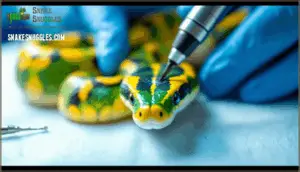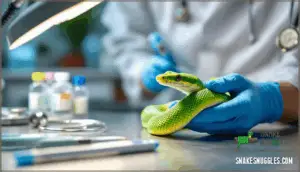This site is supported by our readers. We may earn a commission, at no cost to you, if you purchase through links.

A basic checkup ranges from $50 to $150, but emergency surgery can hit $1,000 or more. The price depends on your location, the vet’s expertise, and what your snake actually needs.
Most owners skip preventative care because they assume it’s expensive, then face massive bills when a minor issue becomes an emergency. Understanding the cost structure helps you budget smartly and avoid financial panic when your scaly friend needs help.
Table Of Contents
- Key Takeaways
- Importance of Reptile Vets
- Finding a Snake Vet Near Me
- Services Provided by Reptile Vets
- Cost of Snake Vet Services and Affordable Options
- Snake Vet Appointment Cost
- Preparing for a Reptile Vet Visit
- Benefits of Regular Reptile Veterinary Care
- Choosing The Right Reptile Vet
- Reptile Veterinary Visit and Treatment
- Reptile Rescue Organizations and Affordable Care Options
- Frequently Asked Questions (FAQs)
- How much does a snake vet cost?
- How much does it cost to adopt a pet snake?
- Should you take a snake to the vet?
- What happens at a veterinary appointment?
- Can pet snakes be taken to pet stores?
- How much does a vet visit cost?
- How much does a snake veterinary visit cost?
- How long does it take a snake to get a veterinary visit?
- How much does a snake tank vet cost?
- Do new snakes need veterinary care?
- Conclusion
Key Takeaways
- Snake vet costs range from $50-$150 for routine checkups, but emergency surgeries can exceed $1,000, so budgeting for both preventative care and unexpected expenses protects your wallet and your pet.
- Reptile specialists with ARAV certification catch problems general vets miss because they understand species-specific needs like temperature control and snake anatomy, making their higher fees worth the diagnostic accuracy.
- Regular vet visits detect diseases early when treatment is cheaper and more effective, turning potential thousand-dollar emergencies into manageable fifty-dollar preventative fixes.
- Veterinary schools and teaching hospitals offer the same quality care at 20-40% lower costs than private clinics, making them smart options for budget-conscious snake owners who won’t compromise on their pet’s health.
Importance of Reptile Vets
Your snake isn’t just a pet—it’s a patient who needs specialized care. General vets may not catch what a reptile specialist would spot right away.
Let’s look at why reptile vets matter and what sets them apart from the rest.
Benefits of Specialized Reptile Care
Your snake isn’t just another pet on the exam table—they need a vet who actually speaks their language. Reptile vet services offer species-specific knowledge that catches problems early.
These specialists understand husbandry expertise like temperature gradients and humidity needs. They use specialized equipment designed for reptile veterinary care.
With preventative strategies adapted to snake health, you get enhanced wellbeing and avoid expensive emergencies down the road.
Qualifications and Experience of Reptile Vets
Not every vet who treats dogs and cats knows the first thing about keeping your ball python alive. Choosing the right reptile vet means finding someone with proper credentials:
- Board Certifications prove specialized training beyond vet schools.
- Years Practicing with reptiles builds diagnostic skill.
- Species Expertise makes certain your reptile veterinarian understands snake anatomy.
- Continuing Education through ARAV membership keeps current experience.
Look for ethical practices backed by real expertise.
Association of Reptile and Amphibian Veterinarians (ARAV) Membership
ARAV membership separates the pros from the weekend hobbyists in the treatment of exotic pets. Members meet strict ARAV requirements and follow ethical standards that protect your snake. Continuing education keeps them sharp on the latest treatments.
You can search the member directory to find qualified reptile vets near you. This matters when you’re worried about snake vet costs and finding affordable reptile care. An ARAV-certified vet reduces mistakes that drive up the cost of snake vet services.
Community benefits include shared research and better outcomes for your pet.
Finding a Snake Vet Near Me
Finding the right vet for your snake isn’t always straightforward. Not every clinic treats reptiles, so you’ll need to do some homework.
Here’s how to locate qualified snake vets in your area.
Online Reptile Vet Directories and Listings
Finding the right snake vet doesn’t have to feel like searching for a needle in a haystack. Online reptile vet directories simplify your search with powerful filters by state, city, and specialty. Here’s what makes them invaluable:
- Directory accuracy through verified listings—ARAV’s database includes only active members with documented reptile experience
- Mobile accessibility lets you search by GPS proximity when you need affordable snake vet options fast
- Global coverage spanning all 50 US states, 10 Canadian provinces, and over 90 UK cities
User reviews help you compare the cost of snake vet services before booking. Reptile owners can also utilize a reptile vet directory to locate qualified professionals. Listing updates reflect factors affecting reptile vet costs, and online reptile communities often recommend specific directories for finding affordable reptile care.
State and City-Specific Searches for Reptile Vets
Why should you care about regional search trends when looking for a reptile vet? Colorado leads the nation with 1,300 monthly searches per 100,000 residents, while Hawaii sees only 444. These demand disparities affect vet accessibility and snake vet costs. Population ratios matter too—Colorado has 40 vets per 100,000 people versus Michigan’s 19. Many facilities offer exotic animal services across the United States.
Use directory listings to find affordable care options:
- Search cities like Sedona and Phoenix for high reptile vet concentrations
- Compare cost of snake vet services across nearby regions
- Check ARAV databases for verified snake vet appointment providers
- Target urban areas where exotic pet ownership drives competition
- Review clinic density in states with better population ratios for pricing advantages
Services Provided by Reptile Vets
Reptile vets offer specialized services that go well beyond basic checkups. Your snake needs a vet who knows the difference between normal shedding and a health crisis.
Let’s look at three key services these specialists provide to keep your scaly friend healthy.
Comprehensive Veterinary Care for Reptiles
Your snake’s thorough vet care goes way beyond a quick look and a "you’re good to go." Think reptile health checks that catch problems before they become disasters.
You’ll get snake nutritional advice specific to your pet’s specialized needs. Expect husbandry guidance on everything from temperature control to substrate choices.
Diagnostic testing spots hidden parasites or infections early. These reptile veterinary care services address factors affecting snake vet costs upfront, helping you budget wisely while keeping your scaly friend thriving.
Emergency Medicine and Surgery for Snakes
When your snake’s life hangs in the balance, specialized emergency medicine becomes the difference between survival and tragedy. Reptile vets administer trauma treatment through proven emergency protocols that stabilize your pet fast. Surgical procedures address internal injuries or blockages, with careful attention to anesthesia risks unique to cold-blooded patients. Post-op care instructions ensure recovery stays on track.
The cost of emergency services and surgery varies widely based on:
- Emergency visit fees generally start at $100-$150
- Emergency treatment complexity affecting final bills
- Overnight monitoring and intensive care needs
Your emergency medicine team works to save lives without surprise costs derailing care.
Preventative Care and Husbandry Advice for Reptile Owners
Most reptile health disasters aren’t emergencies at all—they’re slow-motion train wrecks that proper husbandry could have stopped months earlier.
Your snake vet provides preventative care through detailed habitat maintenance guidance and nutritional needs assessments. They’ll troubleshoot shedding issues before they escalate and teach safe interaction methods that protect both you and your snake.
Regular checkups catch common ailments early, when treatment costs pennies compared to crisis intervention. This proactive approach to snake health keeps your reptile thriving while your wallet stays happy.
Cost of Snake Vet Services and Affordable Options
Snake vet costs aren’t one-size-fits-all. Several factors influence what you’ll pay, and knowing your options can save you hundreds of dollars.
Let’s look at what affects pricing and where to find quality care without breaking the bank.
Factors Affecting Reptile Vet Costs
Several economic variables drive what you’ll pay when your snake needs medical attention. Understanding these factors helps you budget for reptile vet care and avoid sticker shock at checkout.
- Geographic location – Midwest clinics average $75 per visit while East Coast practices reach $110 due to overhead costs.
- Treatment complexity – Routine exams run $100-$125, but surgeries requiring extended anesthesia monitoring exceed $1,000.
- Diagnostic tests – Fecal exams add $65-$80, and X-rays tack on another $100-$200 per procedure.
- Clinic reputation – Established specialty practices with ARAV-certified vets charge premium fees for their herpetology expertise.
Local Veterinary Clinics Vs Reptile Specialty Clinics
Choosing between a general vet clinic and a specialty reptile practice isn’t just about finding the closest option—it’s about weighing expertise against your wallet. General vet expertise with snakes varies wildly. Some have minimal reptile training while specialty clinics stock proper equipment like heated exam tables and snake-sized intubation tubes.
Cost differences reflect this gap—local clinics might charge $50-75 for basic visits, but reptile specialists run $100-150 with better diagnostic accuracy. Appointment scheduling is usually easier at general practices, though travel distance to specialty clinics often pays off when your snake’s health is on the line.
Veterinary Schools and Teaching Hospitals for Affordable Care
Your budget mightn’t stretch to specialty clinics, but veterinary schools offer a smart alternative. Teaching hospital costs run 20-40% lower than private practices. Schools like UC Davis and Texas A&M provide supervised student vet clinics where tomorrow’s experts treat your snake under licensed supervision.
Here’s what makes university discounts work:
- Lower overhead: Affordable vet schools pass savings to you
- Quality supervision: Faculty oversee every student exam
- Financial aid programs: Some facilities offer payment plans for snake vet costs
Routine visits average $50-110 versus $100-150 elsewhere. You get solid affordable care while supporting veterinary education.
Snake Vet Appointment Cost
You might wonder what your snake’s vet visit will actually cost you. The price depends on whether it’s a simple checkup or something more serious like emergency surgery.
Let’s break down the different types of appointments and what you can expect to pay.
Average Cost of Routine Check-Ups and Preventative Care
Your snake deserves solid care without draining your wallet. Routine checkups with a reptile vet usually run $50 to $100 nationally, though urban specialty clinics may charge up to $150. Annual exam costs depend on location and clinic types. West Coast visits average $85, Midwest around $75, and East Coast hits $110.
Preventative care—fecal tests, bloodwork, husbandry advice—adds $100 to $250 yearly. Preventative medication can reach $200 annually when needed. Geographic variations matter, so call ahead for estimates. Financial planning helps you budget several hundred dollars yearly for snake vet services without surprises.
| Service Type | Typical Cost Range | Notes |
|---|---|---|
| Office Visit | $40–$150 | Higher in urban areas |
| Annual Checkup | $50–$100 | Varies by region |
| Fecal Test | $10–$30 | Common preventative screen |
| Bloodwork | $80–$200 | Species-specific needs |
| Preventative Care (Annual) | $100–$250 | Includes tests and advice |
Cost of Emergency Services and Surgery for Snakes
Emergency visits hit harder than your routine checkups. Initial exam fees for exotic species run $100 to $250, jumping 25% to 50% after hours.
Surgery costs fall between $400 and $1,500 for typical procedures like foreign object removal or egg binding. Complex cases exceed $2,000. Antivenom costs $400 to $600 per vial when needed. Overnight monitoring adds $500 to $1,500 daily.
Insurance coverage helps manage these unpredictable expenses.
Additional Costs for Diagnostic Tests and Medications
Your wallet’s still not off the hook once surgery wraps up. Diagnostic test prices for bloodwork run $50 to $100. X-rays cost $80 to $150 when internal issues need checking. Lab service fees add up fast.
Medication cost factors depend on your snake’s prescription. Antibiotics range from $30 to $75. Treatment cost impact from these unexpected expenses can double your initial vet bill.
Healthcare costs pile up beyond the basic consultation.
Preparing for a Reptile Vet Visit
Your first reptile vet visit might feel unfamiliar. Knowing what happens during the appointment helps you plan better.
Here’s what you need to prepare for costs, payment choices, and keeping your snake calm.
What to Expect During a Consultation
A reptile vet visit is a bit like a wellness spa day for your snake—minus the cucumber slices. Your vet will perform a physical exam, checking scales, eyes, and body condition. They’ll ask about diet, manner changes, and habitat setup.
Bring your questions prepared. Expect discussion of diagnostic tests if needed and clear treatment options. Routine checkups catch problems early. This consultation gives you real answers about your snake’s health.
Cost and Payment Options for Reptile Vet Services
Understanding the financial side of reptile care doesn’t require a veterinary degree—just a little planning and knowledge of your options. Most clinics offer payment plans that break down larger bills into manageable chunks. Pet insurance for snakes can cover up to 80% of eligible costs after your deductible. Here’s what you need to know:
- Cost transparency: Call ahead and ask for exam fees and common procedure prices
- Insurance options: Nationwide covers snakes for under $21 monthly
- Discount programs: Vet schools and teaching hospitals offer affordable snake vet options
- Payment plans: Split emergency bills into monthly installments
- Negotiating fees: Ask about wellness packages that bundle services at reduced rates
Comparing snake vet costs between clinics helps you find quality care within budget.
Tips for Reducing Stress During a Vet Visit
Most snakes hate car rides and exam tables just as much as you dread the waiting room. Start by getting your snake used to its carrier weeks before the snake vet appointment. Place familiar bedding inside for scent familiarization.
Practice daily interaction so your snake stays calm during the exam. Bring a towel to cover the carrier and block stressful sights. Ask your vet about their restraint techniques beforehand.
This preparation makes routine checkups smoother and keeps affordable care accessible without added stress.
Benefits of Regular Reptile Veterinary Care
Regular vet visits aren’t just about fixing problems when they pop up. They’re your best defense against serious health issues down the road.
Let’s look at three key reasons why consistent reptile care pays off.
Early Detection and Treatment of Reptile Diseases
Catching a reptile disease early is like finding a crack in your tank before it floods the living room. Regular snake vet appointments let you spot disease early signs before they spiral into expensive emergencies. Here’s why routine checkups matter:
- Preventative screenings catch problems you’d miss at home.
- Rapid diagnostics identify infections before they spread.
- Treatment efficacy improves dramatically with early intervention.
- You’ll avoid zoonotic risks that threaten both you and your pet.
Early detection and treatment of reptile diseases saves money and lives.
Importance of Preventative Care for Reptile Health
Preventative care is like giving your snake a strong immune system and a clean slate before trouble even knocks on the door. Regular snake vet appointments catch respiratory infections and parasites before they become expensive emergencies.
Proper husbandry practices and habitat maintenance keep disease prevention front and center. Proactive healthcare means affordable care in the long run because you’re investing in reptile health instead of scrambling for costly snake vet services later.
Improved Treatment Success With Regular Veterinary Care
Regular vet visits don’t just keep your snake healthy—they stack the odds in your favor when treatment is actually needed. Early intervention makes a huge difference. Your reptile vet builds a health baseline through consistent monitoring. That means spotting trouble fast and acting before small issues become big emergencies.
Here’s why a proactive approach wins:
- Better diagnosis speed – Your vet knows your snake’s normal patterns
- Lower treatment costs – Catching problems early means simpler fixes
- Enhanced outcomes – Small adjustments beat major interventions
- Preventative strategies – Individualized care plans specific to your snake
- Peace of mind – You’re not guessing when something seems off
Improved treatment success comes from building that relationship with your snake vet services provider. The cost of snake vet services drops when you invest in affordable care upfront instead of scrambling during crisis mode.
Choosing The Right Reptile Vet
Picking the right reptile vet can feel like a puzzle when you’re new to snake ownership. You want someone who knows their scales from their scutes and won’t treat your pet like a science experiment.
Let’s look at three key things to think about before you book that first appointment.
Digital Communication Ethics
When you’re scrolling through online reviews and clinic websites, trust becomes your most valuable currency. Digital communication ethics protect both you and your snake. Here’s your guide:
- Verify Credentials: Check ARAV membership and certifications before sharing pet details online.
- Protect Privacy: Responsible content sharing means limiting personal information when posting questions publicly.
- Spot Misinformation: Cross-reference veterinary advice across sources to uphold patient confidentiality and quality care.
Data Privacy Concerns
Your vet’s online portal might collect more information about your snake than you realize. Ask about record security and data breach risks before sharing details. Responsible clinics practice informed consent and protect owner confidentiality.
Your digital footprint matters. Make sure patient confidentiality and digital communication ethics guide their veterinary services. Strong data privacy concerns deserve answers before booking veterinary care.
Online Identity Management
Before you click "book appointment" on that clinic website, take a hard look at what personal information you’re handing over. Check their privacy settings and data security practices first.
Your digital footprint matters when sharing sensitive details like healthcare cost comparison or pet insurance info. Strong reputation management and social media awareness protect your online identity management.
Ask about their digital communication ethics and data privacy concerns before typing in credit card numbers.
Reptile Veterinary Visit and Treatment
When you bring your snake to the vet, you’ll see how different it is from a regular pet visit. The vet will conduct a thorough physical exam and may run diagnostic tests to check your snake’s health.
Understanding what happens during the visit helps you know what to expect and why each step matters for your pet’s care.
Physical Exam and Diagnostic Tests for Reptiles
A good reptile vet exam is part detective work, part science experiment, and entirely focused on your snake’s survival. Your reptile vet uses exam techniques like checking body condition, scanning for mites, and testing reflexes. Sample collection might include fecal tests or blood draws. Lab analysis reveals parasites or infections fast. Imaging costs vary, but X-rays help spot internal issues. Interpretation skills matter—experienced vets catch subtle signs early, saving you money on treatments down the road.
What your snake vet appointment generally includes:
- Physical exam checking eyes, mouth, scales, and overall body condition
- Diagnostic tests like fecal samples to detect parasites or bacterial infections
- Imaging options such as X-rays when internal problems are suspected
- Lab analysis with results interpreted by vets experienced in reptile health
Handling and Restraint Techniques for Reptile Safety
Proper grip technique separates a calm vet visit from a wrestling match with your scaly friend. Your reptile vet bolsters the body evenly—never grabbing the tail—to prevent injury during the physical exam. Restraint tools like snake hooks keep venomous snakes at safe distances. Stress reduction starts with gentle movements and minimal time spent interacting with the animal. Bite prevention means reading body language and respecting warning signs throughout the veterinary exam.
Essential interaction principles your snake vet appointment includes:
- Secure interaction practices adapted to your snake’s size and temperament
- Restraint tools designed specifically for secure control during the vet visit
- Stress reduction techniques that keep your snake calm and cooperative
Administration of Medications and Treatments for Reptiles
Once your vet determines the treatment plan, getting medication into your snake requires precision and patience. Dosage calculations factor in your snake’s weight to guarantee safety.
Injection techniques deliver antibiotics beneath the scales. Oral medication works for parasites but takes a steady hand. Topical treatments soothe skin conditions without stress.
Fluid therapy helps dehydrated snakes recover faster. Your vet explains each method so you can continue medical treatments at home confidently.
Reptile Rescue Organizations and Affordable Care Options
Beyond traditional vet clinics, reptile rescue organizations serve as a lifeline for snake owners addressing veterinary expenses. Over 6 million U.S. households keep reptiles as pets, and rescue groups increasingly bridge the gap between high costs and quality care. These organizations partner with clinics to offer subsidized services, often reducing bills by 20-70% for income-qualified clients. Routine wellness exams drop to $30-$55 instead of the usual $75-$100 at specialty practices.
Rescue grant funding from ASPCA, Banfield, and PetSmart backs these affordable snake vet options with allocations between $5,000 and $50,000 annually. Low-cost clinics connected to rescues provide monthly appointments for exams and diagnostics, making preventative care accessible.
Financial assistance programs target households earning under $60,000, offering:
- Discounted surgery, dental work, and emergency services through rescue partnerships
This community welfare approach helps snake owners save money on veterinary expenses while maintaining excellent reptile care standards.
Frequently Asked Questions (FAQs)
How much does a snake vet cost?
Snake vet costs usually range from $45 to $75 for routine check-ups. Emergency procedures and diagnostic costs can push expenses past $100.
Medication prices vary by treatment. Insurance options help manage snake healthcare expenses.
How much does it cost to adopt a pet snake?
Adoption fees usually run $30 to $100, though species costs vary widely. Ball pythons command higher prices due to popularity. Age influence matters—juveniles often cost more than adults.
Don’t forget enclosure setup and initial supplies, which dwarf adoption fees and greatly impact pet snake ownership costs.
Should you take a snake to the vet?
Yes, snakes need vet visits. Illness indicators like lethargy or appetite loss require immediate attention.
Preventative checkups catch problems early when treatment costs less. Regular reptile vet visits justify their cost by preventing expensive emergencies later.
What happens at a veterinary appointment?
When the vet opens the door, it’s time to put your cards on the table. During your snake vet appointment, expect a thorough physical examination, diagnostic tests like bloodwork or x-rays, and husbandry advice specific to your pet’s needs.
Can pet snakes be taken to pet stores?
Most pet stores don’t allow customer snakes inside due to store policies, disease transmission risks, and stress factors. Legality issues and snake safety concerns also matter.
Pet owners should contact snake vet clinics for proper pet ownership guidance instead.
How much does a vet visit cost?
You know how some things cost more than they should? Consultation costs for exotic vets usually run $50 to $100.
Treatment expenses and medication costs vary based on what your snake needs.
Affordable snake vet options exist through vet schools.
How much does a snake veterinary visit cost?
Your snake’s veterinary care costs depend on what’s needed. Routine check-ups run $45 to $75, but diagnostic test prices, emergency service costs, and medication expenses can push bills past $100 or even thousands. Affordable care options exist through vet schools.
How long does it take a snake to get a veterinary visit?
In the blink of an eye, most snake vet visits wrap up in 30 to 60 minutes. Appointment urgency and snake symptoms affect timing. Your vet availability, travel distance, and owner preparedness matter too.
Veterinary care for snakes includes thorough health checks and treatment recommendations.
How much does a snake tank vet cost?
Typical snake vet appointments cost $45–75 for routine check-ups. Emergency care or surgical procedures can exceed $200 or reach thousands. Always budget extra for unexpected veterinary care for snakes.
Tank maintenance costs, heating element costs, and lighting system costs are separate expenses.
Do new snakes need veterinary care?
Your newly acquired snake deserves an initial exam within the first week. This veterinary checkup allows parasite screening and a husbandry review to catch problems early.
Quarantine importance matters too—preventative care protects existing pets.
Conclusion
Your snake’s health isn’t a gamble you want to lose. Understanding snake vet appointment costs before problems arise protects both your wallet and your pet. Budget for routine checkups and set aside emergency funds so financial stress doesn’t delay critical care.
Regular visits with a qualified reptile vet catch issues early when treatment costs less and success rates run higher. Smart planning turns potential disasters into manageable bumps. Your scaly companion depends on you to make informed choices when it matters most.
- https://www.chameleonforums.com/threads/how-much-do-you-pay-for-the-vet.94690/
- https://vety.com/costs/how-much-do-snakes-cost
- https://vdlexternal.cvmbs.colostate.edu/PriceList/PriceListView
- https://cdpm.vetmed.ufl.edu/services/zmdxlab/available-tests/ophidian-tests-and-panels/
- https://www.vet.cornell.edu/animal-health-diagnostic-center/about/news/fees-2025
















